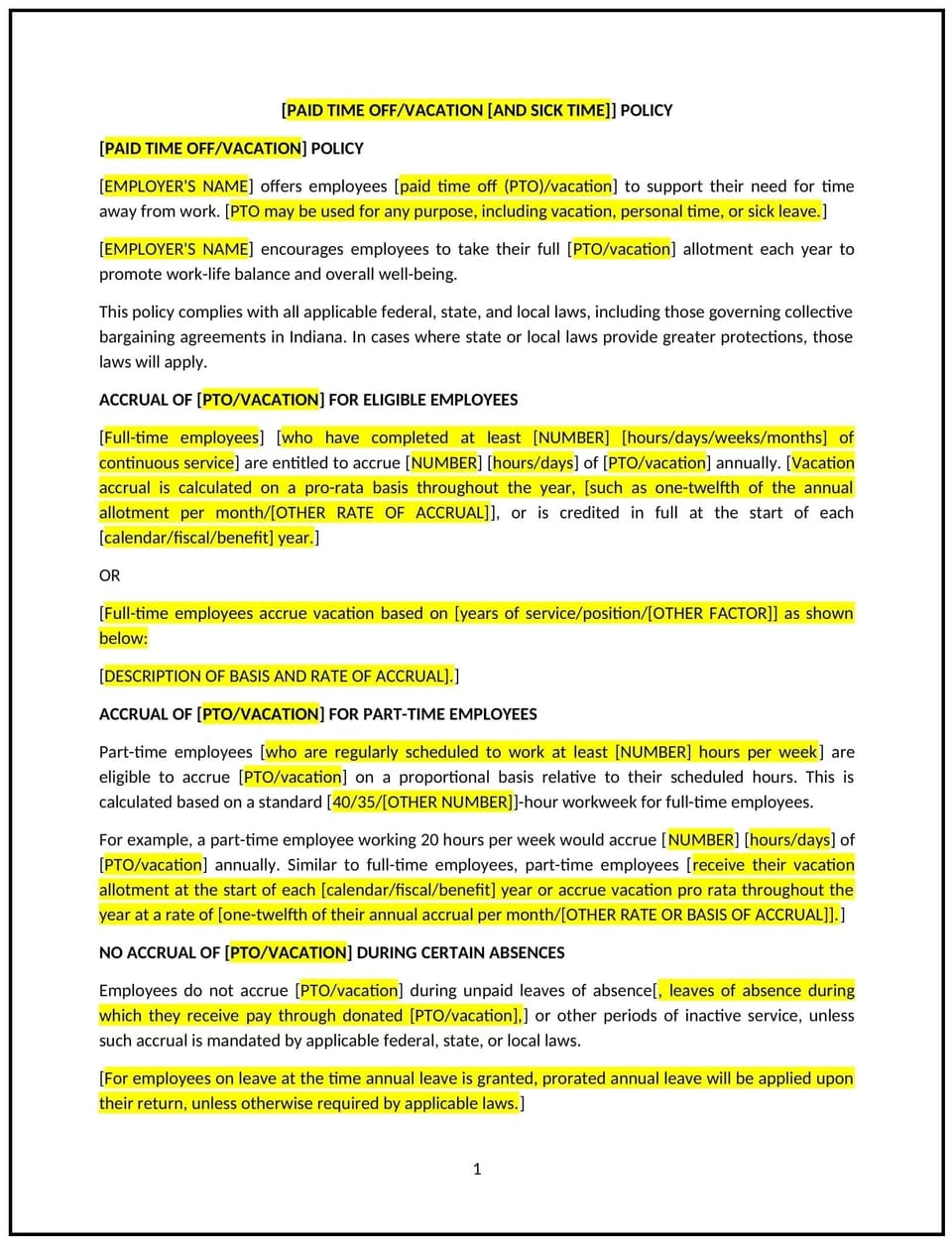Vacation policy (Indiana): Free template

Vacation policy (Indiana): Free template
This vacation policy helps Indiana businesses establish clear guidelines for managing employee vacation time. It outlines accrual rates, scheduling procedures, and eligibility criteria while ensuring consistency and fairness. By implementing this policy, businesses can support work-life balance, maintain productivity, and promote employee satisfaction.
By adopting this policy, Indiana businesses can ensure employees understand their vacation benefits and expectations while maintaining operational efficiency.
How to use this vacation policy (Indiana)
- Define eligibility criteria: Specify which employees are eligible for vacation time based on factors such as employment status (full-time or part-time) and tenure.
- Outline accrual and limits: Clearly state how vacation time is accrued (e.g., monthly or annually), the maximum amount of vacation time employees can accrue, and any rollover or use-it-or-lose-it provisions.
- Detail request procedures: Provide instructions for requesting vacation time, including notice periods, the approval process, and how scheduling conflicts are resolved.
- Address pay during vacation: Clarify whether vacation time is paid or unpaid and include information about pay rates during vacation periods.
- Include blackout periods: Specify any periods during which vacation requests may be restricted due to business needs, such as peak seasons.
- Provide guidelines for unused time: Outline how unused vacation time is handled, including payout policies upon termination, if applicable.
- Encourage advance planning: Require employees to plan vacations in advance to minimize disruptions to operations.
- Review and update regularly: Periodically assess the policy to ensure it reflects changes in business operations, employee needs, or Indiana regulations.
Benefits of using this vacation policy (Indiana)
Implementing this policy provides several key benefits for Indiana businesses:
- Supports employee well-being: Encourages work-life balance, improving morale and reducing burnout.
- Promotes fairness: Establishes consistent rules for vacation accrual and scheduling, ensuring equal treatment of employees.
- Reduces disputes: Clearly defines expectations, minimizing misunderstandings or conflicts over vacation time.
- Maintains productivity: Encourages advance planning to prevent staffing shortages during employee absences.
- Aligns with regulations: Helps businesses comply with Indiana labor laws and industry standards for vacation benefits.
- Enhances retention: Demonstrates a commitment to employee satisfaction and work-life balance.
Tips for using this vacation policy (Indiana)
- Communicate the policy: Share the policy with all employees during onboarding and ensure it is included in the employee handbook.
- Track accrual and usage: Use a reliable system to monitor vacation accrual and usage to ensure accurate recordkeeping.
- Encourage work coverage planning: Require employees to coordinate with their managers or colleagues to ensure work is covered during their absence.
- Be flexible when possible: Accommodate vacation requests to the extent possible, balancing employee needs with business requirements.
- Monitor compliance: Regularly review vacation practices to ensure alignment with the policy and Indiana regulations.
- Seek feedback: Solicit input from employees to refine the policy and address any concerns about fairness or usability.
Q: How is vacation time accrued under this policy?
A: Vacation time is typically accrued monthly or annually, with the specific accrual rate determined by the employee’s tenure and role, as outlined in the policy.
Q: Can employees carry over unused vacation time to the next year?
A: This depends on the business’s policy. Some businesses allow limited rollover, while others implement a use-it-or-lose-it rule to encourage employees to take time off.
Q: How should employees request vacation time?
A: Employees should submit a formal request to their manager, providing sufficient notice as specified in the policy, to allow for proper scheduling.
Q: Are employees paid for unused vacation time upon termination?
A: This depends on the policy and Indiana regulations. Businesses should clarify whether unused vacation time is paid out when employment ends.
Q: Can vacation requests be denied?
A: Yes, managers may deny vacation requests if they conflict with business needs, such as during blackout periods or staffing shortages.
Q: What happens if multiple employees request vacation during the same period?
A: Managers should resolve conflicts based on factors such as the order of requests, seniority, or business priorities, as outlined in the policy.
Q: Are part-time employees eligible for vacation time?
A: Eligibility for vacation benefits may vary based on employment status. The policy should specify whether part-time employees are included and how their accrual rates are calculated.
Q: How often should this policy be reviewed?
A: The policy should be reviewed annually or whenever there are changes in Indiana labor laws or business operations.
This article contains general legal information and does not contain legal advice. Cobrief is not a law firm or a substitute for an attorney or law firm. The law is complex and changes often. For legal advice, please ask a lawyer.


